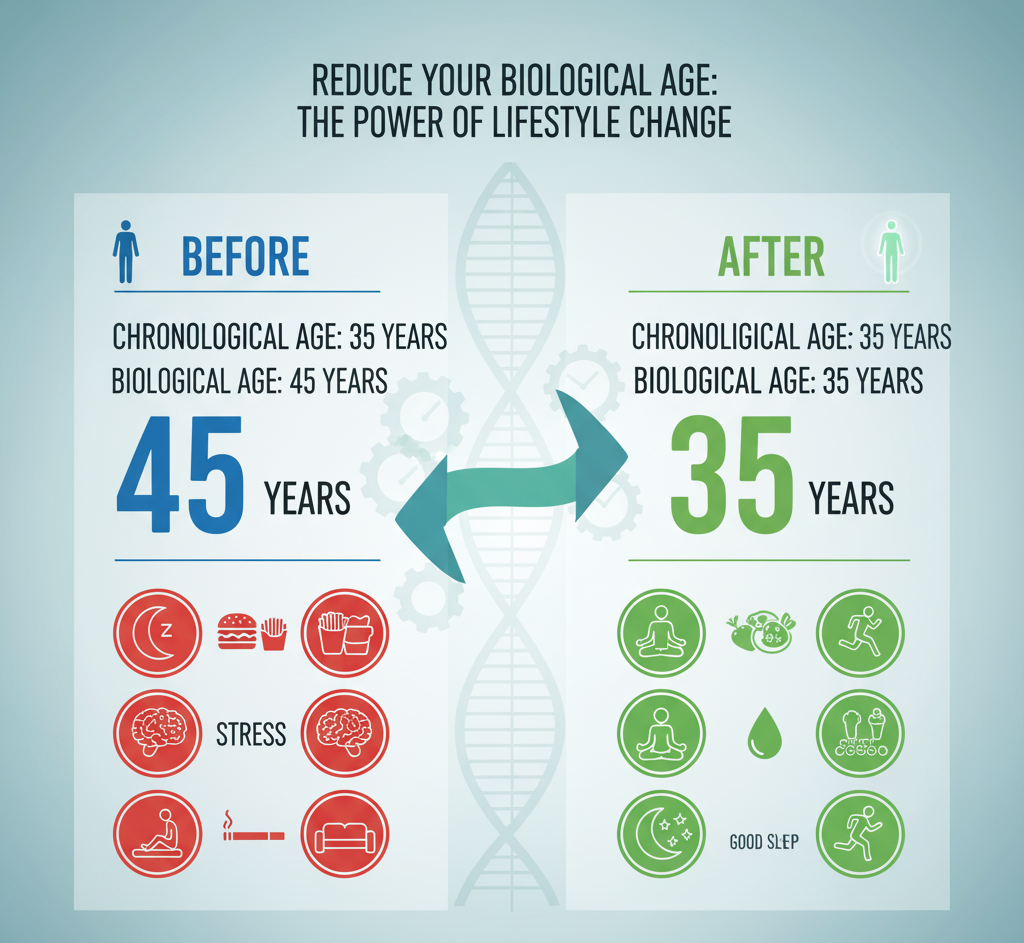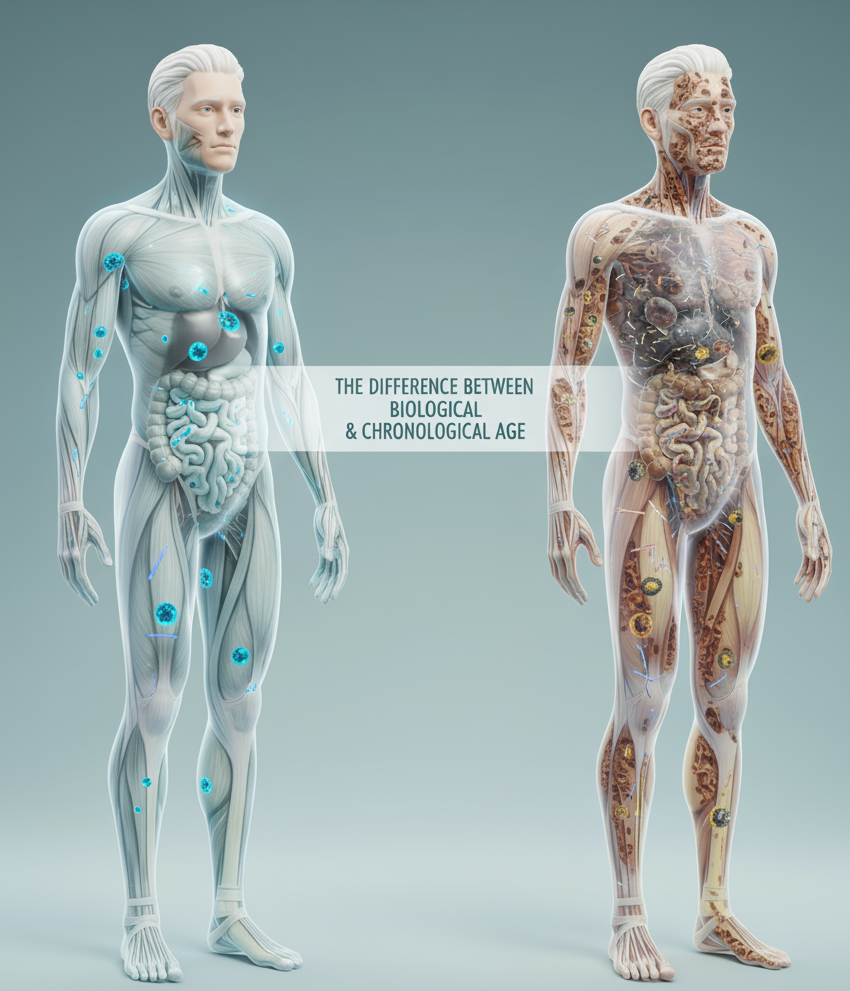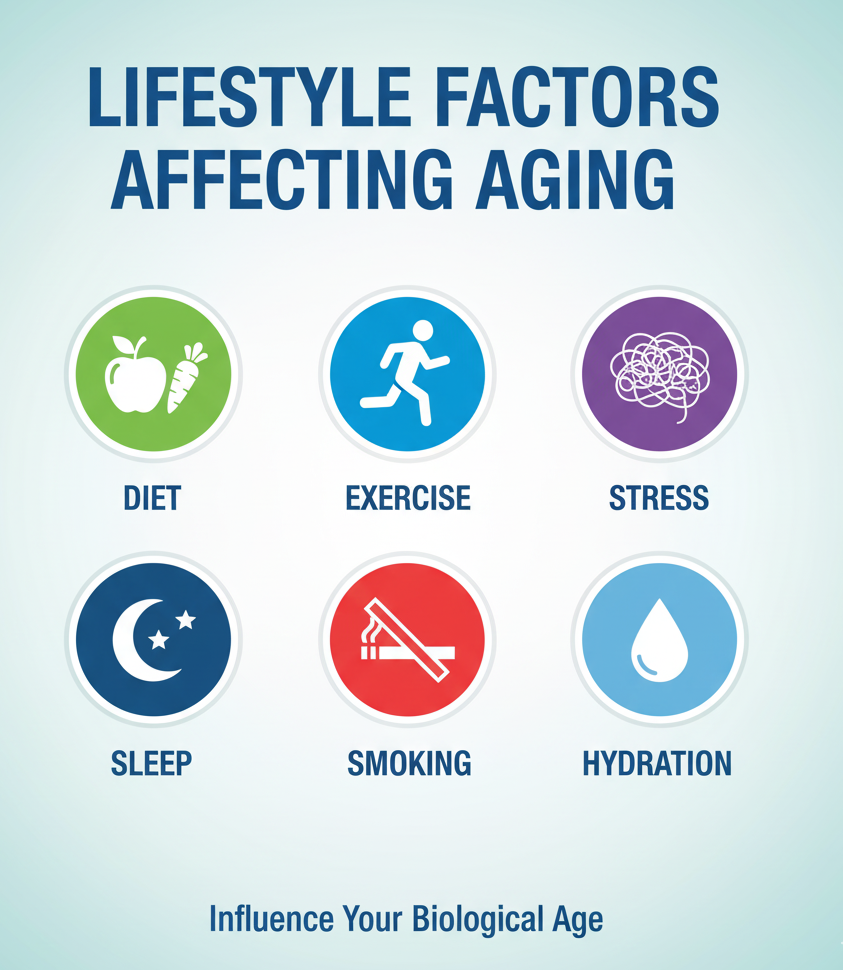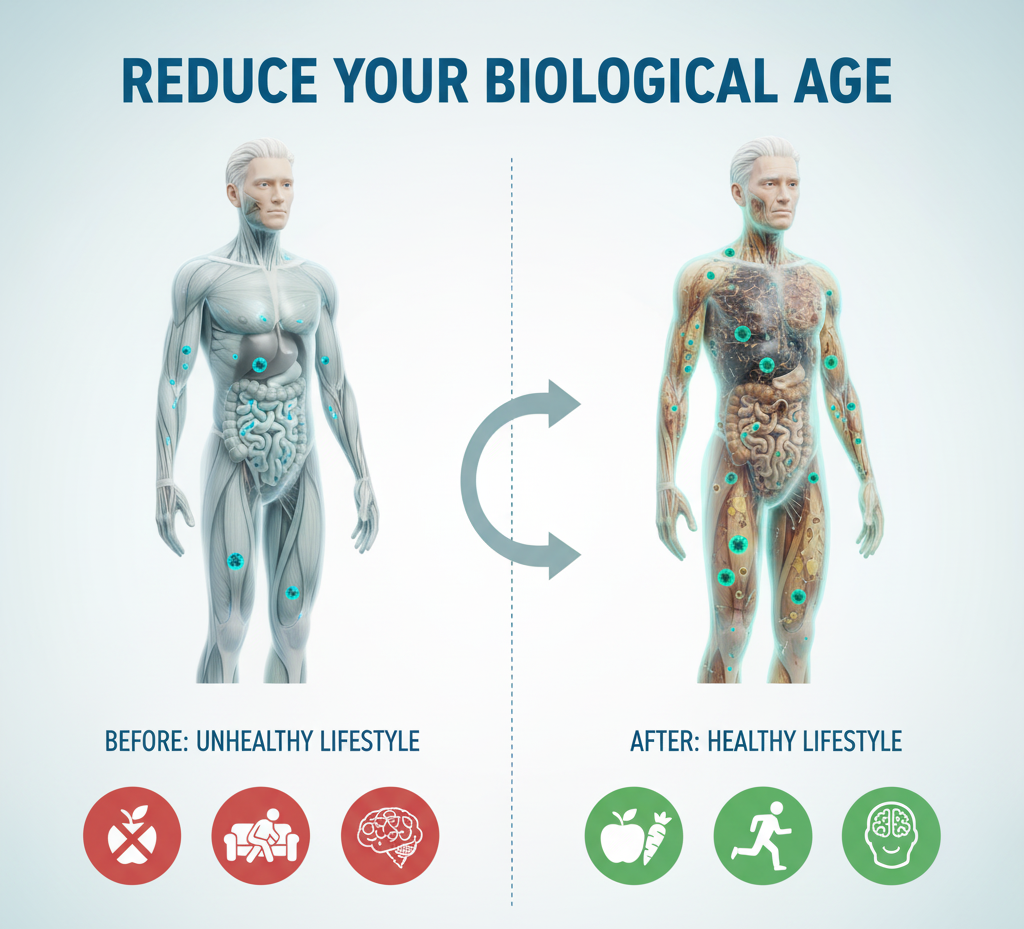Introduction: Age Is More Than Just a Number
Most of us count age by our birth date — but did you know your body could be younger or older than your actual years? That’s where biological age testing steps in.
Unlike chronological age (how many birthdays you’ve had), your biological age reflects how your cells, tissues, and organs are functioning. It measures the impact of your lifestyle, genetics, and environment on your rate of aging.
In India, where lifestyle diseases like diabetes, hypertension, and obesity are rising, understanding your biological age can help you take control of your true health age — long before disease shows up.
What Is Biological Age?
Biological age represents your body’s real physiological state — how “old” or “young” your cells and systems are functioning compared to your actual age.
Two people who are both 40 years old chronologically can have very different biological ages — one might have the body of a 30-year-old, while another may show the cellular wear of a 50-year-old.
It depends on factors like:
-
DNA changes (epigenetics)
-
Diet and exercise habits
-
Sleep quality and stress levels
-
Exposure to pollution or toxins
-
Underlying health conditions
How Biological Age Is Measured
Modern tests assess your epigenetic markers, blood biomarkers, and metabolic functions to calculate biological age.
Common testing methods include:
-
DNA Methylation Tests (Epigenetic Clocks):
Measures chemical changes to your DNA that occur as you age. -
Telomere Length Testing:
Evaluates the protective ends of your chromosomes — shorter telomeres mean faster aging. -
Blood Biomarker Panels:
Checks levels of glucose, cholesterol, inflammation (CRP), and hormones. -
Body Composition and VO₂ Tests:
Analyzes fat, muscle mass, and oxygen efficiency.
These tests are now available in India at advanced diagnostics centers, sometimes even through home collection kits.
ALSO READ:Cirrhosis: Causes, Symptoms, Treatment, And Prevention For Better Liver Health
Why Biological Age Matters
Knowing your biological age gives a more accurate picture of your health than your calendar age. It helps you:
-
Detect early signs of cellular stress or inflammation.
-
Personalize your fitness and nutrition plans.
-
Understand how lifestyle choices affect your longevity.
-
Track progress when making lifestyle changes.
-
Take preventive measures to delay aging and disease.
Simply put, it’s like checking your body’s “real-time age report card.”
Biological Age vs Chronological Age
| Parameter | Chronological Age | Biological Age |
|---|---|---|
| Basis | Years since birth | Cellular function & health |
| Controlled by | Time | Lifestyle & environment |
| Can be changed? | ❌ No | ✅ Yes |
| Importance | Legal/administrative | Medical & preventive |
If your biological age is lower than your chronological age, congratulations — you’re aging gracefully!
If it’s higher, it’s a wake-up call to adopt healthier habits.
Key Factors That Influence Biological Age
-
Diet: High-sugar, low-fiber diets accelerate aging.
-
Exercise: Regular physical activity rejuvenates cells.
-
Sleep: Less than 7 hours daily accelerates oxidative stress.
-
Stress: Chronic stress damages DNA and shortens telomeres.
-
Pollution: Air and chemical exposure increase free radicals.
-
Alcohol & Smoking: Directly linked to faster cellular aging.
-
Hydration: Improves metabolism and flushes toxins.
The Science Behind Biological Age Testing
Scientists use epigenetic clocks (like the Horvath or Hannum clock) to measure changes in your DNA methylation patterns — chemical tags that turn genes “on” or “off.”
These markers reflect your lifestyle and environment. Unlike your genetic code, which is fixed, epigenetic expression can change, meaning you can actually “age slower” by living healthier.
This is one of the most exciting breakthroughs in modern preventive healthcare.
Benefits of Biological Age Testing
-
Personalized wellness insights
-
Early disease detection
-
Motivation for lifestyle change
-
Accurate risk assessment
-
Tracking your progress over time
For example, improving your sleep, diet, and stress management can reduce your biological age by 3–5 years within months, according to recent studies.
Lifestyle and Aging: Slowing the Clock Naturally
Healthy living is your best anti-aging therapy.
Tips to lower biological age:
-
Eat colorful, antioxidant-rich foods.
-
Exercise at least 150 minutes weekly.
-
Get 7–8 hours of quality sleep.
-
Meditate or practice yoga to manage stress.
-
Stay hydrated (2–3 liters daily).
-
Avoid smoking and excessive alcohol.
-
Maintain a healthy weight.
When Should You Get a Biological Age Test?
You should consider testing if you:
-
Have lifestyle-related conditions like diabetes, obesity, or PCOS.
-
Are over 30 and want to track long-term health.
-
Experience chronic fatigue or slow recovery.
-
Want to measure your fitness or anti-aging progress.
-
Are building a preventive healthcare routine.
How to Improve Biological Age Results
If your biological age is higher than your actual age, don’t panic — it’s reversible.
Start by:
-
Adopting a plant-forward diet
-
Reducing refined carbs and processed foods
-
Exercising consistently
-
Prioritizing mental wellness
-
Getting regular health screenings
Tracking improvements every 6–12 months keeps you motivated and informed.
The Future of Biological Age Testing
This field is rapidly expanding. Soon, wearable technology may be able to measure your biological age through real-time biomarkers like heart rate variability, glucose, and oxygen levels.
These insights could power personalized medicine — guiding doctors to predict diseases early and tailor treatment plans for each person’s biology.
Conclusion
Biological age testing bridges the gap between traditional checkups and personalized wellness. It reveals how your daily habits affect your true rate of aging — giving you the power to reverse damage before it turns into disease.
In short, your DNA may be your destiny, but your lifestyle decides how it’s expressed. Every good choice helps your cells stay younger, longer.
Quickobook CTA
Book an appointment with a preventive health specialist or wellness consultant on Quickobook to explore biological age testing and lifestyle optimization.
Visit Quickobook.com for trusted doctors, lab tests, and personalized preventive care.
Disclaimer:
This blog is for educational purposes only. It is not a substitute for professional medical advice or diagnosis. Always consult your doctor before starting new health programs or tests.
50 FAQs: Biological Age Testing
Q1. What is biological age testing?
It measures how fast your body is aging compared to your actual age.
Q2. How is it different from chronological age?
Chronological age is time since birth; biological age shows how your body functions.
Q3. How is biological age calculated?
Through DNA methylation, telomere length, and blood biomarkers.
Q4. Can biological age be reduced?
Yes, with healthy lifestyle habits.
Q5. What does a lower biological age mean?
Your body is aging slower and functioning efficiently.
Q6. Is biological age testing available in India?
Yes, through advanced labs and preventive healthcare clinics.
Q7. What is DNA methylation?
A chemical process that regulates gene expression and reflects aging rate.
Q8. What are telomeres?
Protective DNA caps that shorten as we age.
Q9. Is the test painful?
No, it usually involves a blood or saliva sample.
Q10. How long do results take?
Typically 2–3 weeks, depending on the lab.
Q11. Can diet affect biological age?
Yes, a balanced diet lowers inflammation and aging.
Q12. Can exercise reverse aging?
Regular workouts can improve biological age by years.
Q13. What foods help slow aging?
Berries, nuts, leafy greens, and whole grains.
Q14. What speeds up aging?
Smoking, poor sleep, stress, and junk food.
Q15. Is biological age testing safe?
Completely safe and non-invasive.
Q16. How often should I test?
Once a year or after major lifestyle changes.
Q17. What’s a good biological age difference?
Being 5–10 years younger biologically is ideal.
Q18. Can genetics affect aging?
Yes, but lifestyle plays a larger role.
Q19. Can stress make you biologically older?
Yes, chronic stress accelerates DNA aging.
Q20. Does hydration help aging?
Yes, it supports detox and cellular repair.
Q21. Are supplements useful?
Only if prescribed by a doctor.
Q22. Can antioxidants help?
Yes, they protect cells from oxidative stress.
Q23. Is fasting good for aging?
Intermittent fasting can improve longevity markers.
Q24. What is an epigenetic clock?
A test that measures DNA methylation to estimate biological age.
Q25. Can sleep affect aging?
Yes, poor sleep accelerates cellular damage.
Q26. Can air pollution increase aging?
Yes, it causes oxidative stress.
Q27. Are there anti-aging therapies?
Yes, antioxidant and peptide therapies may help under supervision.
Q28. Can yoga slow aging?
Yes, by reducing stress and improving blood flow.
Q29. Does smoking age your body faster?
Yes, it shortens telomeres significantly.
Q30. What is metabolic age?
It reflects how efficiently your body burns energy.
Q31. Can alcohol increase biological age?
Yes, it damages liver and DNA over time.
Q32. What’s a healthy biological age score?
Equal to or lower than your actual age.
Q33. Can emotional health affect aging?
Yes, mental wellbeing influences biological resilience.
Q34. Is biological age testing expensive?
Costs range ₹4,000–₹15,000 in India.
Q35. Can menopause affect biological age?
Yes, hormonal changes accelerate cell aging.
Q36. Can sleep therapy reverse aging?
It helps reduce biological stress markers.
Q37. What’s the role of gut health?
Healthy microbiome slows inflammation and aging.
Q38. Can meditation affect biological age?
Yes, it reduces stress-related gene activity.
Q39. Can high sugar intake age you faster?
Yes, it increases inflammation and glycation.
Q40. Are these tests accurate?
Yes, when done in certified labs.
Q41. Can biological age help track progress?
Yes, it shows results of lifestyle interventions.
Q42. Can dehydration affect results?
Slightly, as it impacts metabolism.
Q43. What’s a normal biological age for 40-year-olds?
Ideally between 35–40 or younger.
Q44. Do genetics determine maximum lifespan?
Partly — lifestyle defines how genes express.
Q45. Can hormone therapy help?
Only under medical advice for age-related decline.
Q46. Can obesity increase biological age?
Yes, it accelerates inflammation and oxidative stress.
Q47. Can sun exposure age you faster?
Yes, UV damage speeds up skin and DNA aging.
Q48. Is biological age reversible?
Yes, with consistent lifestyle changes.
Q49. How can I start testing?
Book through preventive health labs or Quickobook.com.
Q50. Why is biological age testing the future of health?
It personalizes prevention, empowering you to stay younger, longer.












Comments (0)
No comments yet. Be the first to share your thoughts!
Leave a Comment